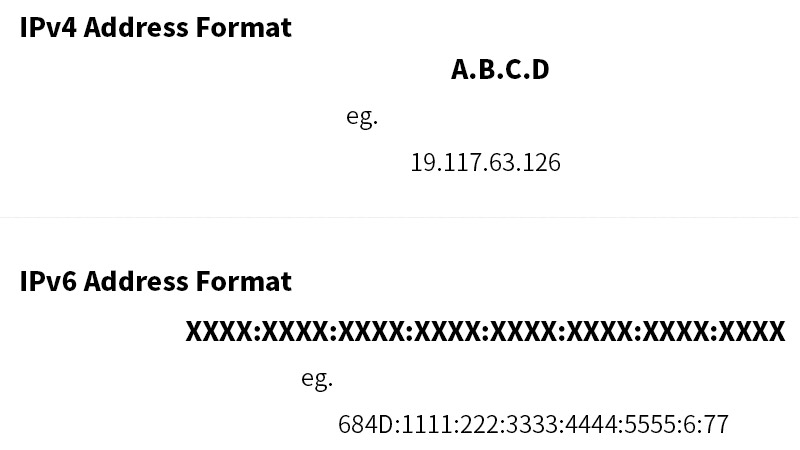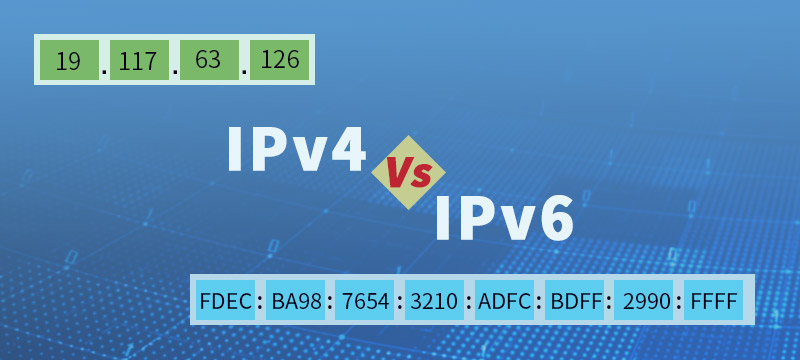Why Is IPv6 Better Than IPv4
Limitations of IPv4
IPv4 Address Space Is Depleting
IPv4 address size is 32-bit, which means IPv4 can provide a total of about 4 billion unique addresses. However, 4 billion addresses are the total number of addresses in theory. Due to the unreasonable address allocation, many addresses are wasted. The actual available addresses are about 2.5 billion, which is far less than the total number of addresses in theory. Moreover, since the 1980s, with the fast-growing number of Internet users and mobile computing devices, the available IPv4 addresses were depleting rapidly.
The Node Setting is Complex In IPv4
When connecting the host to the network, the TCP/IP protocol (What is TCP/IP protocol) needs to be selected first, and then set the required IP address, subnet mask, gateway address, and DNS address through the network node. In addition, the routing configuration of network nodes is also required.
QoS Limitation
IPv4-based Internet was designed to provide a simple quality of service (QoS). However, with the increase of multimedia services on IP networks, such as IP phones, video conferences, and other real-time data applications, there are strict requirements for bandwidth, time domain, bit error rate, and jitter. Although IPv4 proposes real-time transmission protocols that support real-time transmission, additional protocols increase the complexity and cost of networks. Therefore, IPv4 is still lacking in QoS and can not meet the requirements in certain applications with encryption and authentication needs such as e-commerce.
IPv4 Routing Problem
Since the length of the IPv4 routing table increases with the growing number of networks, the time for the router to query the correct route in the routing table also increases. The delay will affect the performance of the network. Therefore, solving the IPv4 routing problem is far more urgent than solving the shortage of IPv4 address space.
IPv4 vs IPv6: Why Is IPv6 Better Than IPv4
The following are the advantages and improvements of IPv6 over IPv4.
Larger Address Space Than IPv4
The IPv6 address size is 128-bit, it ranges from 0000:0000:0000:0000:0000:0000:0000:0000 to ffff:ffff:ffff:ffff:ffff:ffff:ffff:ffff:ffff:ffff:ffff. The number of IPv6 addresses is 2^128(3.4*1038). Statistically speaking, the global population is about 7.8 billion in 2022, which means each one in the world could be provided with 4.3*1028 IP addresses. In IPv6 networks, each interface allows one or more IPv6 addresses, including unicast address, anycast address, and multicast address. On the whole, IPv6 solves the problem of IPv4 addresses depleting ultimately. The example of IPv4 and IPv6 addresses is shown in the following figure.

IPv4 vs IPv6 Format
Simpler Header and Better Flexibility Than IPv4
IPv6 discards several fields of IPv4 header to make data processing more effective. IPv6 header consists of a basic header and multiple extended headers. The length of the IPv6 header is fixed and doesn't require much memory capacity. In addition, the IPv6 protocol provides high scalability, which allows users to expand the header.
More Efficient Configuration Method Than IPv4
IPv6 address adopts an automatic configuration method. The commonly used automatic configuration technology includes stateful automatic configuration and stateless automatic configuration. Stateless automatic configuration requires that the local link supports multicast, and the network interface can also send and receive multicast. There are two methods for stateful automatic configuration, one is the BooTstrap protocol and the other is the Dynamic Host Configuration Protocol (DHCP). IPv6 can automatically configure the user address, which avoids the inefficiency of manual configuration.
Better Quality of Service (QoS)
Since IPv6 protocol adopts a simplified header structure, IPv6 ensures the high-speed forwarding and low latency of data packets. For example, for those requiring special QoS, the priority can be set in IP packets, and then the router processes these data respectively according to the priority of IP packets. In this way, reliable real-time message transmission is realized, which improves the QoS to a great extent.
More Safer Than IPv4
The security of IPv6 is based on IPSec, which is a part of IPv6. For all IPv6 network nodes, IPSec is necessary. The main function of IPSec is to provide encryption and authentication services for data packets at the network layer. It provides two security mechanisms, that is authentication and encryption.
The authentication mechanism enables the data receiver to confirm the identity of the data sender and whether the data has been tampered with in the transmission process. The encryption mechanism guarantees data confidentiality by encoding the data, so as to prevent the data from being intercepted by someone in the transmission process. On the whole, IPSec strengthens the security of the Internet and prevents unfortunate events such as attacks on enterprises and theft of confidential data. Therefore, IPv6 is safer than IPv4.
Smaller Routing Table Than IPv4
IPv6 address assignment adopts the aggregation mechanism, which defines a very flexible hierarchical addressing and routing structure, and greatly reduces the length of the routing table. Multiple networks at the same level are represented as a unified network prefix in the upper router, which effectively and significantly maintains the router, and greatly reduces the routing and storage of the router
What Is the Difference between IPv4 and IPv6
After explaining the benefits of IPv4 over IPv6, the following chart explains the difference between ipv4 and ipv6.
Will IPv4 Replace By IPv6?
The transition from IPv4 to IPv6 is an inexorable trend, however, the transition is a slow, gradual process. Although the technical barriers have been overcome for change from IPv6 to IPv4, the majority of the current network deployment is still IPv4. There are billions of IPv4-based network devices and terminal devices, and the cost of migration is huge. When will IPv6 replace IPv4, there is no clear answer. IPv6 and IPv4 will coexist for a long time.
Conclusion
New technologies support new applications. In turn, new applications promote the standardization and commercialization of new technologies. IPv6 protocol can meet the high-performance and scalable network interconnection, and can also solve many problems existing in the current IPv4 network. Although the actual large-scale application of IPv6 still takes some time to transition, by studying the differences between IPv6 and IPv4 above, we can understand that the transition of IPv4 to IPv6 has become the general trend.











